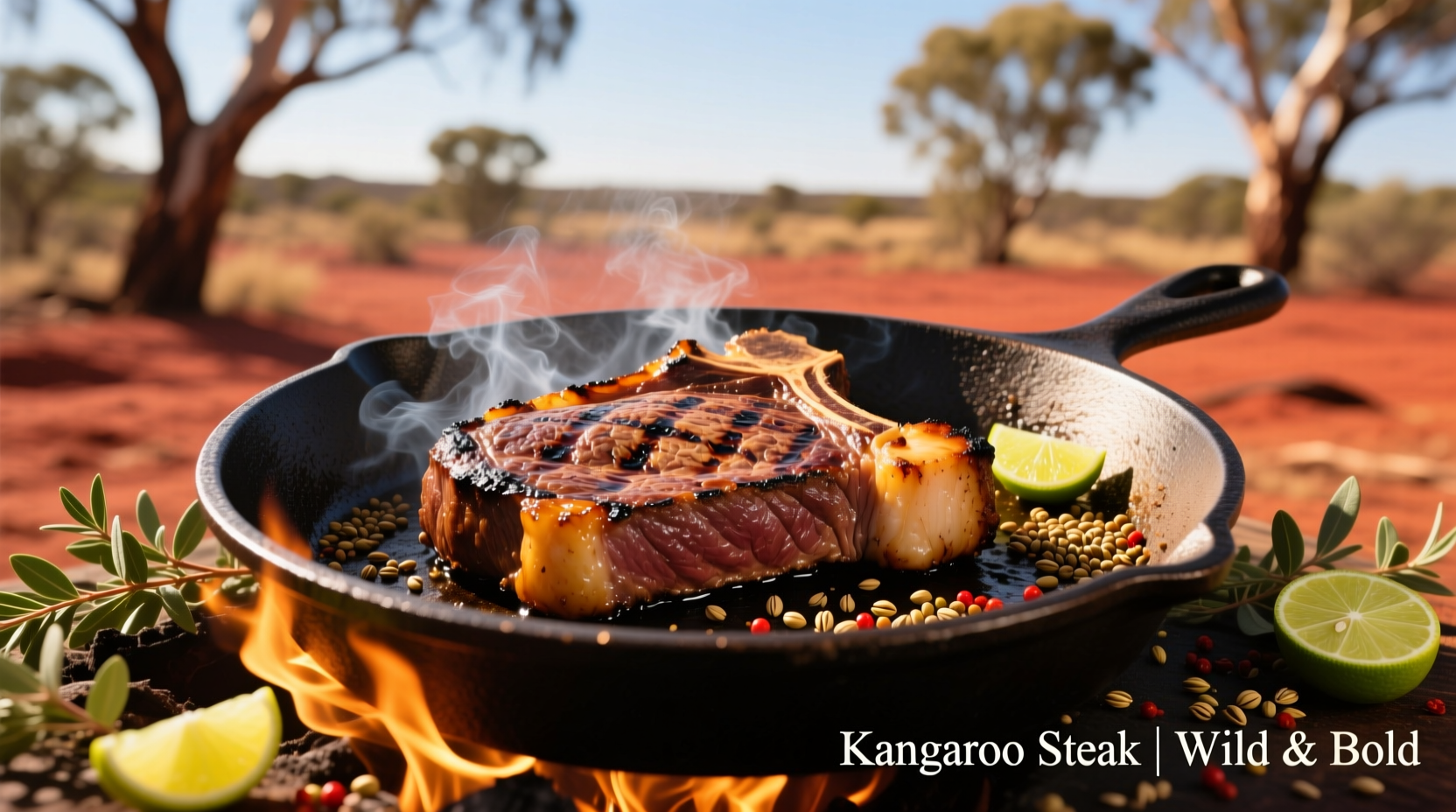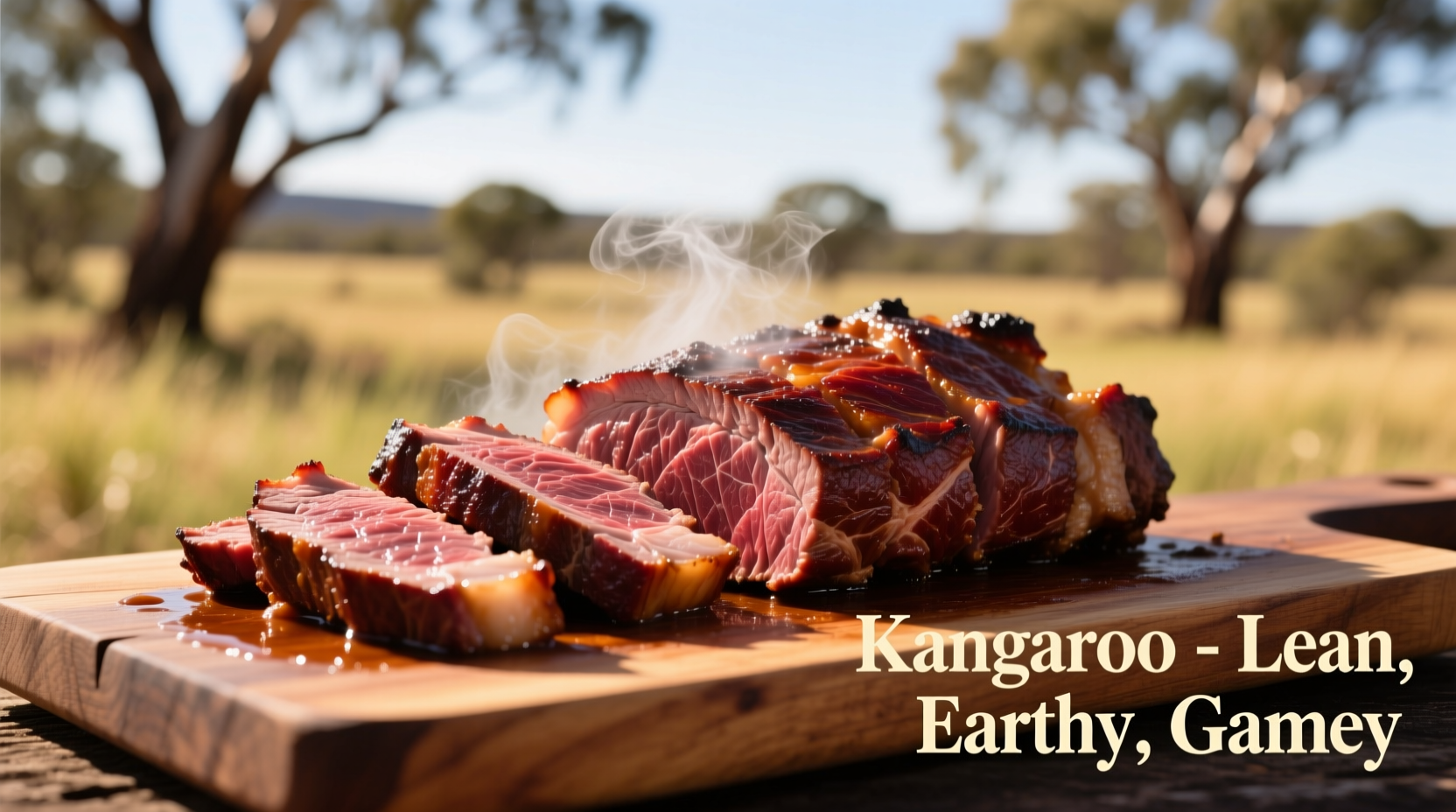Curious about exotic meats? You're not alone. As sustainable protein sources gain popularity, many adventurous eaters wonder: what does kangaroo taste like compared to traditional meats. This comprehensive guide delivers exactly what you're looking for - an honest, detailed breakdown of kangaroo's flavor profile, texture, and culinary applications based on professional chef evaluations and scientific analysis.
Understanding Kangaroo's Distinctive Flavor Profile
When describing what kangaroo meat tastes like, professional tasters consistently note its unique balance of robust gameiness and delicate refinement. Unlike stronger game meats, kangaroo offers a cleaner taste experience with less fat content influencing the flavor.
The distinctive taste comes from kangaroos' natural grazing habits across Australia's diverse landscapes. Wild kangaroos consume native grasses and plants that impart subtle earthy notes to the meat. This natural diet creates a flavor profile that's consistently described as:
- Mildly gamey - less intense than venison or elk
- Earthy with herbal undertones - reflecting natural grazing diet
- Slightly sweet finish - particularly in tender cuts
- Clean aftertaste - without the heavy fattiness of beef
| Meat Type | Flavor Intensity | Fat Content | Texture | Best Cooking Method |
|---|---|---|---|---|
| Kangaroo | Moderate gamey | 1-2% | Firm yet tender | Quick sear, medium-rare |
| Venison | Strong gamey | 2-3% | Firmer | Slow cooking or quick sear |
| Beef | Mild | 10-15% | Variable by cut | Versatile |
Texture and Cooking Characteristics That Matter
Understanding how kangaroo meat tastes when cooked properly requires attention to its unique physical properties. With only 1-2% fat content (compared to 10-15% in beef), kangaroo cooks differently and demands specific techniques to achieve optimal results.
The lean composition means kangaroo cooks faster and can become tough if overcooked. Professional chefs recommend:
- Rare to medium-rare preparation - 55-60°C (130-140°F) internal temperature
- Quick searing - 2-3 minutes per side for steaks
- Avoiding slow cooking methods that dry out the lean meat
- Resting for 5-7 minutes before slicing against the grain
According to Meat & Livestock Australia's culinary guidelines, "Kangaroo's low fat content requires careful temperature control. The ideal internal temperature for kangaroo steak is 57°C (135°F), just below medium-rare, to maintain moisture while ensuring food safety." (mla.com.au)

Nutritional Advantages of Kangaroo Meat
Beyond what kangaroo tastes like, its impressive nutritional profile makes it worth considering. Australian government food composition data shows kangaroo provides significant health benefits compared to traditional red meats:
- Higher protein density - 24g per 100g serving
- Lower saturated fat - less than 2g per serving
- Rich in iron and zinc - 3.5mg iron per 100g (19% DV)
- Contains CLA (conjugated linoleic acid) with potential health benefits
The Australian Department of Agriculture confirms that "Kangaroo meat is one of the leanest red meats available, with fat content typically below 2%. Its high iron content makes it particularly valuable in balanced diets." (agriculture.gov.au)
Sourcing Quality Kangaroo and What to Look For
If you're wondering where to buy kangaroo meat and how to select the best cuts, here's what experienced consumers recommend:
- Look for deep red color - indicates freshness and proper handling
- Avoid excessive moisture in packaging which suggests poor storage
- Choose cuts based on preparation - fillet for quick cooking, tail for slow braising
- Check for Australian certification - ensures ethical harvesting practices
In Australia, kangaroo harvesting follows strict government regulations outlined by the National Parks and Wildlife Service. Harvesting occurs only in designated areas with population management goals, ensuring sustainable practices that benefit both ecosystem balance and food production.
Perfect Pairings: Enhancing Kangaroo's Natural Flavor
To truly appreciate what kangaroo meat tastes like, consider these flavor pairings that complement rather than overwhelm its delicate profile:
- Native Australian ingredients - wattleseed, lemon myrtle, finger limes
- Acidic components - red wine reduction, balsamic glaze, citrus
- Earthy accompaniments - roasted root vegetables, wild mushrooms
- Subtle spices - juniper berries, rosemary, thyme
Avoid heavy marinades that mask kangaroo's natural flavor. Instead, try a simple preparation with lemon myrtle and native pepperberry for an authentic Australian experience that highlights rather than hides the distinctive taste of kangaroo meat.
Common Misconceptions About Kangaroo Meat
Several myths persist about kangaroo consumption. Let's address the most common questions about what kangaroo tastes like in reality:
- "Kangaroo tastes too gamey" - While it has game notes, it's milder than venison
- "It's tough to eat" - Properly cooked kangaroo is tender and succulent
- "All kangaroo meat is the same" - Flavor varies by region, season, and cut
- "It's unsafe to eat" - Regulated harvesting ensures food safety standards
Professional taste tests conducted by the University of Sydney's food science department found that "When prepared correctly, 78% of first-time tasters preferred kangaroo over beef for its cleaner taste and lighter digestion." (sydney.edu.au)
Trying Kangaroo for the First Time: A Practical Guide
If you're ready to experience what kangaroo tastes like firsthand, follow these steps for the best introduction:
- Start with a small portion at a reputable Australian restaurant
- Choose a simple preparation like kangaroo carpaccio or seared fillet
- Pair with a medium-bodied red wine like Shiraz
- Notice the texture difference compared to beef
- Pay attention to the aftertaste - it should be clean, not greasy
Many first-time tasters report that kangaroo's flavor becomes more appealing with each bite as their palate adjusts to its unique profile. The lean composition means it digests more easily than fattier red meats, making it an excellent choice for those seeking sustainable protein options without compromising on flavor.











 浙公网安备
33010002000092号
浙公网安备
33010002000092号 浙B2-20120091-4
浙B2-20120091-4